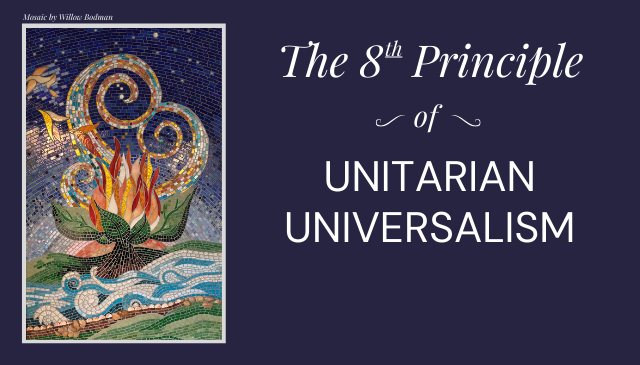 UUCF members adopted the Unitarian Universalist 8th Principle in June 2021.
UUCF members adopted the Unitarian Universalist 8th Principle in June 2021.
The 8th Principle states:
We covenant to affirm and promote journeying toward spiritual wholeness by working to build a diverse, multicultural Beloved Community by our actions that accountably dismantle racism and other oppressions in ourselves and our institutions.
This report details the actions taken to “accountably dismantle racism and other oppressions” in the year since the 8th Principle was adopted.
Background
Bruce Pollack-Johnson, congregant at UU Church of the Restoration in Philadelphia, started to develop the 8th Principle in 2013. He was joined by Paula Cole Jones, member of All Souls Church Unitarian in Washington, DC. Together they crafted the wording as noted above. It has been endorsed by BLUU (Black Lives of Unitarian Universalism) and DRUMM (Diverse Revolutionary UU Ministries). To date, it has been adopted by 54 congregations and UU groups. For additional background, click here.
Resources
- Video: Youth Value the 8th Principle
- Video: The 8th Principle Matters to Members of the BIPOC Community
- 48 books by Indigenous writers to read to understand residential schools
Frequently Asked Questions
What was the process for adopting the 8th Principle at UUCF?
Following discussion in small groups, congregational listening sessions, dissemination of written materials and a workshop with Paula Cole Jones, UUCF member voted to include the 8th Principle among its stated congregational principles. In doing so, UUCF became part of a larger team encouraging the Unitarian Universalist Association to put racial justice at the center of our commitments.
What is the process for adoption of the 8th Principle by the Unitarian Universalist Association?
An Article II Study Commission has been established by the UUA to review the principles and purposes. Paula Cole Jones, co-author of the 8th Principle, is a member of the commission. The Study Commission will present its recommendations related to the 8th Principle and the other UU principles to the UUA Board of Trustees in January 2023 for inclusion in the business of the 2023 UUA General Assembly. It is anticipated that the meaning and intent of the 8th Principle will be reflected in the recommended principles.
Why are the principles under review and why the 8th Principle?
Unitarian Universalism is a living faith. The current Seven Principles were adopted in 1985 and reflected greater gender inclusivity. Periodic review of principles, sources and purposes are carried out to reflect current priorities and concerns. Many UUs contend that absence of any mention of racism and other oppressions is a glaring omission. UUCF is proposing the inclusion of the 8th Principle as a means to live out our mission of “transforming ourselves, our community and the world through acts of love and justice.”
Can we change the wording of the 8th Principle?
No, we cannot. At this early stage, congregations need to adopt the proposed resolution as it is written. If each congregation adopted a separate language, we would be creating a kind of chaos. In addition, the current wording was written by Black leadership and allies in the UUA and endorsed by BLUU and DRUMM. While it is phrased differently from the more vision-focused language of the other Seven Principles, it was specifically worded to explicitly express the need for accountable action because the implicit language of dignity, respect, equity and inclusion in the current Seven Principles has not resulted in sustained and significant change toward anti-racism and anti-oppression in the UUA or its congregations.
What might change as a result of the UUA ultimately adopting the 8th Principle?
Part of the journey will be figuring out what those changes might be. An ongoing process of learning and listening to marginalized people will be integral to all we do. We will work together to uncover and change barriers to inclusion. Some of the work will likely be based on the “Widening the Circle of Concern” UUA report.
UUCF has already been making changes in the direction of becoming a more inclusive community with greater diversity of music and musicians, readings, RE offerings and responsive social justice and outreach.
It is possible that a team will be formed to help UUCF identify priorities and training possibilities. The congregation, with facilitation from leadership, will determine those additional steps together.
